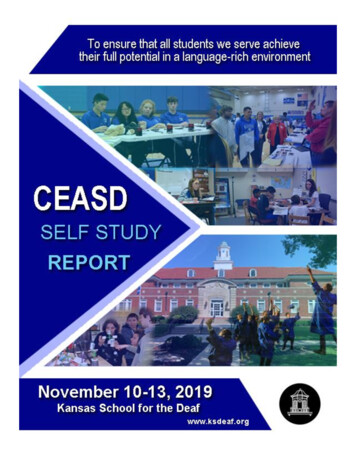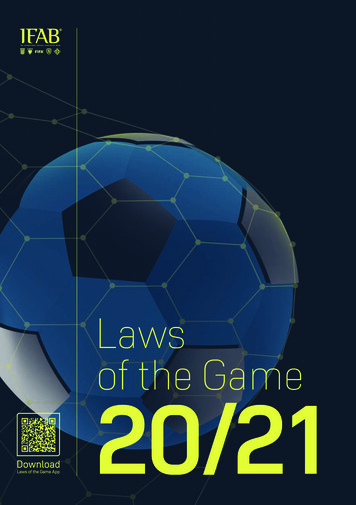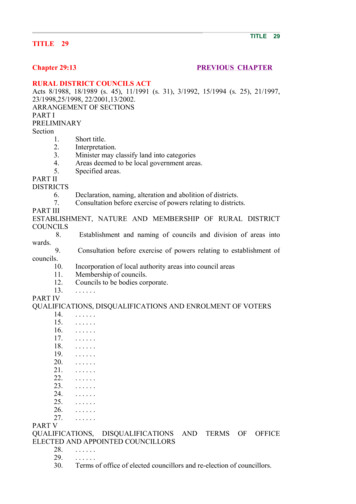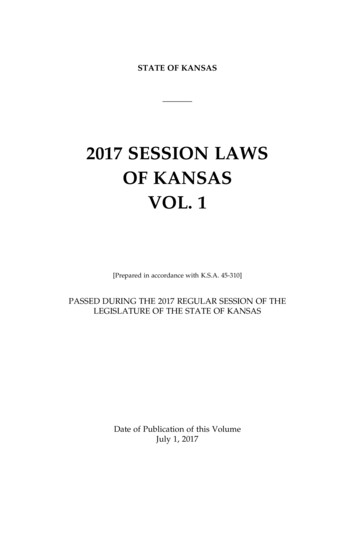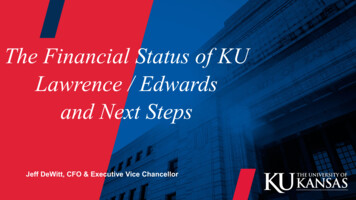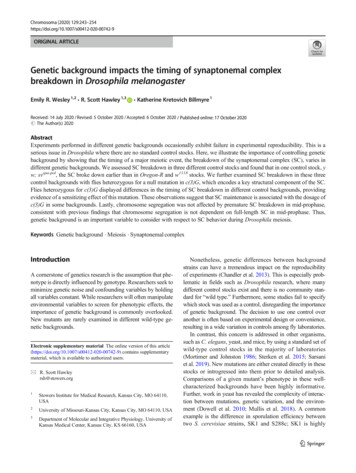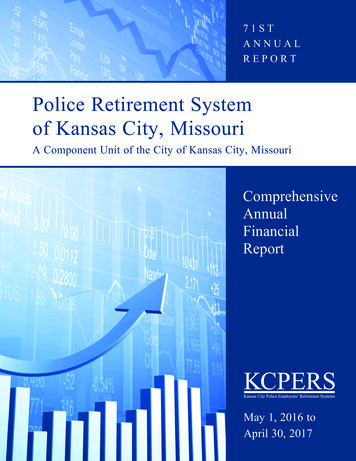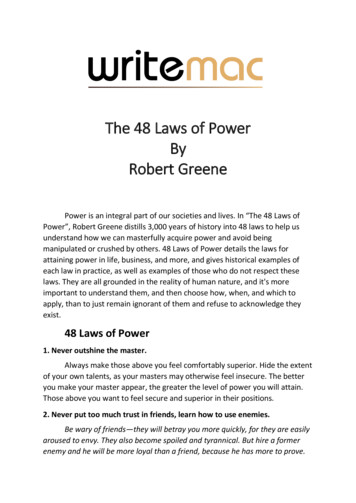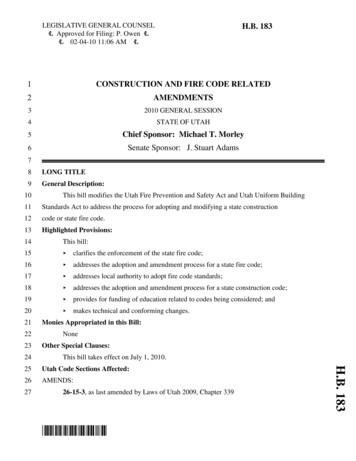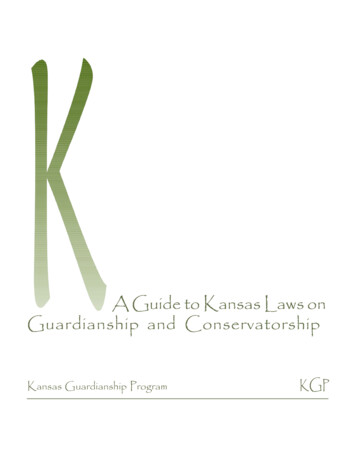
Transcription
A Guide to Kansas Laws onGuardianship and ConservatorshipKansas Guardianship ProgramKGP
The act for obtaining a guardian or conservator, or both, is found in Kansas statutes annotated59-3050 through 59-3096.This publication reflects statutory revisions through the 2008 Kansas Legislative Session. It isintended to be an overview and general guide and the information contained herein shouldnot be taken in lieu of specific advice.The KGP is a partnership involving the State of Kansas and its citizen volunteers. The programrecruits, trains and monitors volunteers who serve as court appointed guardians orconservators. Program eligibility criteria is applicable. Individuals served have limitedfinancial resources (Medicaid recipients) and do not have family members willing orappropriate to assume guardianship or conservatorship responsibilities.The program is seeking individuals interested in volunteering for this important advocacywork. To apply to become a volunteer, visit our website at www.ksgprog.org or contact us at1-800-672-0086.Kansas Guardianship ProgramMain Office3248 Kimball Ave., Manhattan KS 66503-0353(785) 587-8555 (785) 587-9626 FAX1-800-672-0086 Kansas Onlywww.ksgprog.orgWichita Office505 S Broadway, Suite 207Wichita KS 67203(316) 269-2525Kansas City Office601 N Mur-Len Rd., Suite 10BOlathe, KS 66062(913) 780-3300Guide / 3
OUTLINEGuide / 41.INTRODUCTION1.1Revised law1.2A guide2.THE GOAL OF GUARDIANSHIP OR CONSERVATORSHIP2.1Intent of guardianship or conservatorship2.2Alternatives to guardianship or conservatorship2.3Guardianships or conservatorships are not indefinite3.DEFINITIONS AND TERMINOLOGY3.1Adult with an impairment in need of a guardian or a conservator, or both3.2Appropriate alternative3.3In need of a guardian3.4Meet essential needs for physical health, safety, or welfare3.5In need of a conservator3.6Manage such person’s estate3.7Conservator3.8Conservatee3.9Guardian3.10 Ward3.11 Natural Guardian3.12 Minor3.13 Minor with an impairment in need of a guardian or conservator, or both3.14 Person who has been previously adjudicated as impaired in another state3.15 Person in need of an ancillary conservator3.16 Voluntary conservatee3.17 Temporary guardian or conservator3.18 Standby guardian or conservator3.19 Successor guardian or conservator3.20 Co-guardian or co-conservator3.21 Adjudication3.22 Venue3.23 Personal or agency interest4.PRIORITY OF WHO MAY BE APPOINTED AS GUARDIAN OR CONSERVATOR4.1Priority list4.2Court considerations of proposed guardian or conservator before appointment4.3Court determines if the eligible individual is fit and proper5.INDIVIDUAL OR CORPORATE GUARDIANS5.1Fit and proper persons and private, non-profit certified corporations6.GENERAL DUTIES AND RESPONSIBILITIES OF GUARDIANS6.1Guardian is under the control and direction of the court
6.26.36.46.5Court authority to appoint counsel for guardianMandatory orders for guardiansGuardian considerations when making decisions on behalf of wardGuardian fulfilling general duties andresponsibilities7.LIMITATIONS OF POWERS OF A GUARDIAN7.1Powers guardians do not have7.2Powers guardians have with court approval8.GUARDIAN LIABILITY8.1Guardian not liable to a third party in certain circumstances9.GENERAL DUTIES AND RESPONSIBILITIES OF CONSERVATORS9.1Conservator is under the control and direction of the court9.2Court authority to appoint counsel for conservator9.3Mandatory orders for conservators9.4Conservator considerations in making decisions on behalf of conservatee9.5Conservator fulfilling general duties and responsibilities10.LIMITATION ON CONSERVATOR POWERS10.1 Powers conservators have with court approval11.CONSERVATOR LIABILITY11.1 Conservator not liable to a third party in certain circumstances12.CONFIDENTIALITY OF MEDICAL RECORDS AND OTHER REPORTS12.1 Medical or treatment records, evaluations or investigative reports filed with thecourt, may be court ordered to be separately maintained in a confidentialmanner13.PROCEDURES FROM PETITION TO APPOINTMENT13.1 Intention of the procedures13.2 Petition13.3 Mandatory Orders13.4 Examination and Evaluation13.5 Notices13.6 Trial13.7 Findings13.8 Oath of Guardianship or Conservatorship13.9 Bond of Conservatorship13.10 Basic Instructional Program for Guardians or Conservators13.11 Letters of Appointment13.12 Conservator Inventory14.GUARDIANSHIP AND CONSERVATORSHIP PLANS14.1 Court may require or guardian or conservator may choose to file14.2 Plans not necessary in every caseGuide / 5
14.314.414.5Guide / 6Provisions of guardianship planProvisions of conservatorship planCourt action upon filing of a plan15.RESTORATION TO CAPACITY PROCEDURES15.1 A person with a guardian may be restored to capacity15.2 Upon filing of a petition, court determines if further proceedings needed15.3 Court may order an examination and evaluation15.4 Court may appoint an attorney for ward or conservatee15.5 Court finding16.REVIEW PROCEDURES BY THE COURT16.1 Court review of guardian report and conservator accounting16.2 Court determines reasonable administration of guardianship or conservatorship16.3 Court may set a hearing16.4 Circumstances which would trigger the filing of a special report or accounting17.TERMINATION OF GUARDIAN OR CONSERVATOR PROCEDURES17.1 Circumstances in which a guardianship or conservatorship may be terminated17.2 Circumstances in which a voluntary conservatorship may be terminated18.COSTS AND FEES18.1 Filing a petition18.2 Costs and fees may be allowed for various services18.3 Assessed to estate of ward, conservatee and/or others19.THE COURT19.1 In all proceedings19.2 The public trust
1.INTRODUCTION1.1 The Kansas statute on guardianship and conservatorship was substantially revised inthe 2002 session of the Kansas Legislature and signed into law by Governor BillGraves. The changes, which became effective July 01, 2002, revise the proceduresfor obtaining a guardian or a conservator, and specify duties and responsibilities ofthose appointed to serve as guardian or conservator.1.2. This guide is an introduction to and an explanation of the major concepts andprocedures of the current law.2.THE GOAL OF GUARDIANSHIP OR CONSERVATORSHIP2.1 Guardianship or conservatorship is an attempt by the state to provide a way to helpand protect a person when that person is incapable of self-care or of acting in his orher own best interest. A guardianship or conservatorship, while intended to behelpful, may place the most severe restrictions on a person’s freedoms that a courtcan impose. A guardianship or conservatorship should be used only as a method oflast resort and be considered only after all other lesser restrictive alternatives havebeen explored.2.2 These alternatives may include offering informal community intervention throughfamily, friends, or volunteers with help in such things as shopping for food orproviding banking assistance in paying bills. Professional assistance can be foundthrough agencies offering social services, case management and home andcommunity based services. Alternative help with financial affairs can be obtainedthrough Social Security representative payeeships, durable powers of attorney,voluntary conservatorships and, durable power of attorney for health care decisions.The giving of durable powers of attorney and voluntary conservatorships requiresthat the person involved have capacity at the time he or she signs such agreements.2.3 A guardianship or a conservatorship is not necessarily intended to be forever. Theobjective – no matter how unlikely it may seem – is to restore the person to completedecision-making capacity and to close the guardianship or conservatorship asexpeditiously as possible. The intent should be to create minimal restrictions and tofoster the greatest possible degree of comfort, dignity and self-sufficiency.3.DEFINITIONS AND TERMINOLOGY( K.S.A. 59-3051 et. seq.)3.1Adult with an impairment in need of a guardian or a conservator, or bothMeans a person 18 years of age or older, or a minor who is considered to be of theage of majority pursuant to K.S.A. 38-101, and amendments thereto, or upon whomthe rights of majority have been conferred pursuant to K.S.A. 38-108, andamendments thereto, whose ability to receive and evaluate relevant information, orto effectively communicate decisions, or both, even with the use of assistiveGuide / 7
technologies or other supports, is impaired such that the person lacks the capacity tomanage such person’s estate, or to meet essential needs for physical health, safetyor welfare, and who is in need of a guardian or a conservator, or both.Guide / 83.2Appropriate alternativeMeans any program or service, or the use of a legal device or representative, whichenables a person with an impairment to adequately meet essential needs forphysical health, safety or welfare, or to reasonably manage the person’s estate.Appropriate alternatives may include, but are not limited to: power of attorney,durable power of attorney, power of attorney for health care decisions, living will,trust, joint tenancy and representative payee.3.3In need of a guardianA person who, because of both an impairment and the lack of appropriatealternatives for meeting essential needs, requires the appointment of a guardian.3.4Meet essential needs for physical health, safety or welfareMeans making those determinations and taking those actions which are reasonablynecessary in order for a person to obtain or be provided with shelter, sustenance, personalhygiene or health care, and without which serious illness or injury is likely to occur.3.5In need of a conservatorA person who, because of both an impairment and the lack of appropriatealternatives for managing such person’s estate, requires the appointment of aconservator.3.6Manage such person’s estateMeans making those determinations and taking those actions which are reasonablynecessary in order for a person to receive and account for personal or businessincome, benefits and property, whether real, personal or intangible and except forreasons of indigency; to purchase or otherwise obtain necessary goods or services;to pay debts and expenses; to sell, exchange or otherwise dispose of property; andto plan for future accumulation, conservation, utilization, investment, and otherdisposition of financial resources.3.7ConservatorAn individual or a corporation who or which is appointed by the court to act onbehalf of a conservatee.3.8ConservateeA person who has a conservator.3.9GuardianAn individual or a corporation certified in accordance with K.S.A. 2002 Suppl. 59-
3070 and amendments thereto, who or which is appointed by a court to act onbehalf of a ward.3.10 WardA person who has a guardian.3.11 Natural guardianMeans both the biological or adoptive mother and father of a minor if neither parenthas been found to be an adult with an impairment in need of a guardian or has hadparental rights terminated by a court of competent jurisdiction. If either parent of aminor is deceased, or has been found to be an adult with an impairment in need ofa guardian or has had parental rights terminated by a court of competentjurisdiction, then the other parent shall be the natural guardian, unless alsodeceased, or found to be an adult with an impairment in need of a guardian, or hashad parental rights terminated by a court of competent jurisdiction, in which case noperson shall qualify as the natural guardian.3.12 Minor - child under the age of 18Minors are wards of their parents (or, in some cases, of court appointed adults)because they are under the age of 18. Parents (or a parent) are considered to be the"natural guardians" and, by implication, conservators of their minor child’s life andpersonal money.3.13 Minor with an impairment in need of a guardian or conservator, or bothMeans a person under 18 years of age who otherwise meets the definition of an"adult with an impairment in need of a guardian or conservator, or both" and whoseimpairment is expected to continue beyond the age of 18. The adjudication andorders will follow the minor into adulthood. A parent is not automatically theguardian of a son or daughter when the child becomes 18 years old. If a parentwishes to become the guardian of his or her adult child, only by court order followinga specific due process procedure can the child be made a ward and the parent beappointed the guardian.3.14 Person who has been previously adjudicated as impaired in another stateAllows that, for a ward or conservatee who resides out-of-state, the out-of-stateguardian or conservator may file a petition in Kansas asking the court to give full faithand credit to the other state’s adjudication and to appoint a guardian or conservatorin Kansas.3.15 Person in need of an ancillary conservatorMeans a conservatee who is not residing in Kansas and who has been adjudicated inneed of a conservator in another state, and who has property in Kansas for which aconservator is required.Guide / 9
3.16 Voluntary ConservateeA person who voluntarily requests a court appointed conservator to assist withmanaging his or her finances and property, and is not adjudicated as in need of aguardian or conservator under Kansas law (K.S.A. 59-3056 et. seq.).3.17 Temporary Guardian or ConservatorAfter a petition for a hearing on a proposed ward or conservatee has been filed, asituation may arise where there exists imminent danger to the physical health orsafety of the person or that there exists imminent danger that the estate of theperson will be significantly depleted while the details of the hearing procedure havenot yet been satisfied. In these situations the court may appoint a temporaryguardian or conservator (K.S.A. 59-3073). The court can decide if a guardianship orconservatorship is needed and can appoint an emergency appointee who shall beassigned specific duties and powers necessary to protect against the imminentdangers shown or the depletion of financial resources.3.18 Standby Guardian or ConservatorThe court may appoint another person to assume the duties and powers assigned tothe guardian or conservator upon the resignation, disability, temporary absence ordeath of the guardian or conservator. This assures a ward or conservatee and thosewho care about them that adequate provision is made for ongoing supervision of theward’s welfare or conservatee’s estate (K.S.A. 59-3074).3.19 Successor Guardian or ConservatorSuccessor guardian or conservator is a person appointed to succeed an individualearlier appointed as guardian or conservator (K.S.A. 59-3088 et. seq.).3.20 Co-Guardian or Co-ConservatorThe court may appoint one or more individuals (or corporations) to serve as guardianor conservator for an individual and shall specify if the co-guardians or coconservators may act independently or only in concert (K.S.A. 59-3087 et. seq.).3.21 AdjudicationThe trial process in which the court makes a finding of whether or not a person isdetermined to be legally in need of a guardian or conservator, or both.3.22 VenueVenue of guardianship and conservatorship provides that guardianship proceedingsmay be held in the proposed ward’s county of residence or where the proposed wardmay be found. Conservatorship proceedings may be held in the proposedconservatee’s county of residence or if the proposed conservatee resides outside thestate, in any county in which the proposed conservatee’s property is located. In acombined guardianship and conservatorship proceeding, venue is exclusively in thecounty of residence of the proposed ward or conservatee.Guide / 10
3.23 Personal or Agency InterestPersonal or agency interest shall include, but not be limited to, details of any financial,agency or other transactions between a proposed guardian, guardian, proposedconservator or conservator and the proposed ward, ward, proposed conservatee orconservatee as applicable.4.PRIORITY OF WHO MAY BE APPOINTED AS GUARDIAN OR CONSERVATOR( K.S.A. 59-3068 et. seq.)4.1 The court in appointing a guardian or conservator shall give priority in the followingorder to:(1) the nominee of the proposed ward or proposed conservatee, if the nominationis made within any durable power of attorney;(2) the nominee of a natural guardian;(3) the nominee of a minor who is the proposed ward or proposed conservatee, if theminor is over 14 years of age;(4) the nominee of the spouse, adult child or other close family member of theproposed ward or proposed conservatee; or(5) the nominee of the petitioner.4.2 Before appointing a guardian or conservator the court shall: consider the workload,capabilities and potential conflicts of interest of the proposed guardian orconservator; give particular attention in making the appointment to the number ofother cases in which the proposed guardian or conservator, other than acorporation, is currently serving as guardian or conservator, particularly if thatnumber is more than 15 or more wards or conservatees. In appointing a guardian fora person who is an adherent of a religion whose tenets and practices call for relianceon prayer alone for healing, the court shall consider, but shall not be limited to, theappointment of an individual as guardian who is sympathetic to and willing tosupport this system of healing.4.3 The court shall determine that the individual who is eligible for appointment isrequired to be a "fit and proper person" or a "suitable person." The court may orderan investigation of the past history and character of a proposed nominee.5.INDIVIDUAL OR CORPORATE GUARDIANS5.1 K.S.A. 59-3070 provides that a guardian may be either an individual or a corporation.A corporation, in order to be eligible for appointment as a guardian, must be aprivate, nonprofit corporation that is suitable to perform the duties of a guardian ascertified by the Secretary of Social and Rehabilitation Services (K.S.A. 59-3070 (c)).6.GENERAL DUTIES, RESPONSIBILITIES, POWERS AND AUTHORITIES OF GUARDIANS( K.S.A. 59-3075 et. seq.)6.1The individual or corporation appointed by the court to serve as the guardian shallGuide / 11
carry out diligently and in good faith, the general duties and responsibilities; shall atall times be subject to the control and direction of the court; and, shall act inaccordance with the provisions of any guardianship plan if one is filed with the court.6.2 The court shall have the authority to appoint counsel for the guardian, and the feesof the attorney may be assessed as costs pursuant to K.S.A. 59-3094, andamendments thereto.6.3 Mandatory OrdersThe guardian shall: become and remain personally acquainted with the ward, the spouse of the wardand other interested persons associated with the ward and who areknowledgeable about the ward, the ward's needs, and the ward’s responsibilities exercise authority only as necessitated by the ward's limitations encourage the ward to participate in making decisions affecting the ward encourage the ward to act on the ward's own behalf to the extent the ward isable encourage the ward to develop or regain the skills and abilities necessary to meet theward's own essential needs and to otherwise manage the ward's own affairs6.4 In making decisions on behalf of the ward, the guardian shall: consider the expressed desires and personal values of the ward to the extentknown to the guardian strive to assure that the personal, civil, and human rights of the ward areprotected at all times act in the best interests of the ward and exercise reasonable care,diligence and prudence file with the court reports concerning the status of the ward and actions of theguardian as the court directs6.5 The guardian shall exercise all powers and discharge all duties necessary or proper toimplement the following provisions: take charge of the person of the ward, and provide for the ward's care,treatment, habilitation, education, support and maintenance consider and provide on behalf of the ward necessary or required consents orrefuse the same assure the ward resides in the least restrictive setting appropriate to the needsof the ward and which are reasonably available assure the ward receives any necessary and reasonably available medical careand, any reasonably available non-medical care or other services as may beneeded to preserve the health of the ward or to assist the ward to develop orretain skills and abilities promote and protect the comfort, safety, health and welfare of the ward make necessary determinations and arrangements for and give necessaryconsents in regard to the ward's funeral arrangements, burial or cremation, theGuide / 12
performance of an autopsy upon the body of the ward, and anatomical gifts ofthe ward. Cremation, autopsies and anatomical gifts are subject to limitationsand provisions in other areas of the law.7.LIMITATIONS OF POWERS OF A GUARDIAN( K.S.A. 59-3075 et. seq.)7.1A guardian shall not have the power on behalf of the ward to: prohibit the marriage or divorce of the ward consent to the termination of the ward's parental rights consent to the performance of any experimental biomedical or behavioralprocedure on the ward, or to the ward participating in any biomedical orbehavioral experiment, without prior review and approval by an institutionalreview board or by a review committee established by the agency, institution ortreatment facility where the procedure or experiment is to occur7.2 Unless approved by the court, a guardian shall not have the power on behalf of theward to: consent to the adoption of the ward place the ward in a treatment facility as defined in K.S.A. 2002 Supp. 59-3077 (h) exercise any control or authority over the ward's estate consent to any psychosurgery, removal of a bodily organ, or amputation of alimb, unless, the surgery, removal or amputation has been approved in advanceby the court, except in an emergency and when necessary to preserve the life ofthe ward or to prevent serious and irreparable impairment to the physical healthof the ward consent to the sterilization of the ward, unless approved by the court following adue process hearing where the ward is represented by a court appointedattorney consent to the withholding or withdrawing of life-saving or life-sustainingmedical care, treatment, services or procedures, except in accordance with theprovisions of any declaration of the ward making a Living Will pursuant to K.S.A.65-28, 101 through 65-28, 109 and amendments thereto; or, if the ward, beforethe appointment of a guardian, executed a durable power of attorney for healthcare decisions (DPOAHC) and the document was not revoked by the ward andthere is included any provision relevant to the withholding or withdrawal of lifesaving or life-sustaining medical care, treatment, services or procedures,· then the guardian shall have the authority to act as provided for in the DPOAHC even if the guardian has revoked or amended the power of attorney, OR,· the guardian may allow the agent appointed by the ward to act on the ward'sbehalf if the guardian has not revoked or amended that power of attorney;OR· where the ward's treating physician shall certify in writing to the guardianthat: the ward is in a persistent vegetative state, or, is suffering from an illnessGuide / 13
8.or other medical condition for which further treatment, other than forrelief of pain, would not likely prolong the life of the ward other than byartificial means, nor would be likely to restore to the ward any significant degree ofcapabilities beyond those the ward possesses, and, which opinion is concurred in by either a second physician or by anymedical ethics or similar committee to which the health care provider hasaccess, established for the purposes of reviewing the circumstances andthe appropriateness of any type of physician’s order which would havethe effect of withholding or withdrawing life-saving or life sustainingmedical care, treatment, services or procedures. The written certificationshall be approved by a court order.to exercise any control or authority over the ward’s estate, except if the court shallspecifically authorize such. The court may assign such authority to the guardian,including the authority to establish certain trusts as provided in K.S.A. 2002 Supp. 593080, and amendments thereto.GUARDIAN LIABILITY8.1 The guardian shall not be personally liable to a third person for the acts of the wardsolely by virtue of the guardian’s appointment, nor shall a guardian who exercisesreasonable care in selecting a third person to provide any medical or other care,treatment or service for the ward be liable for any injury to the ward resulting fromthe wrongful conduct of that third person (K.S.A. 59-3075 (d)).9.GENERAL DUTIES, RESPONSIBILITIES, POWERS AND AUTHORITIES OF A CONSERVATOR( K.S.A. 59-3078 et. seq.)9.1The individual or corporation appointed by the court to serve as the conservator: shall carry out diligently and in good faith, the general duties and responsibilities shall at all times be subject to the control and direction of the court shall act in accordance with the provisions of any conservatorship plan if one isfiled with the court9.2 The court shall have the authority to appoint counsel for the conservator, and the feesof the attorney may be assessed as costs pursuant to K.S.A. 59-3094, and amendmentsthereto.9.3Guide / 14Mandatory OrdersA conservator shall: become aware of the conservatee’s needs and responsibilities exercise authority only as necessitated by the conservatee’s limitations encourage the conservatee to participate in making decisions affecting theconservatee
encourage the conservatee to act on the person’s own behalf to the extent theconservatee is ableencourage the conservatee to develop or regain the skills and abilities necessaryin order for the conservatee to be able to manage the conservatee’s own estate9.4Conservators in making decisions on behalf of the conservatee shall: consider the expressed desires and personal values of the conservatee to the extentknown to the conservator strive to assure that the personal, civil, and human rights of the conservatee areprotected at all times act in the best interests of the conservatee and exercise reasonablecare, diligence and prudence file with the court an initial inventory of all of the property, assets and anysources of regular income of the conservatee’s estate file with the court annual accountings and other reports concerning the status ofthe estate and the actions of the conservator9.5In fulfilling the general duties and responsibilities the conservator shall: pay the reasonable charges for the support, maintenance, care, treatment,habilitation and education of the conservatee in a manner suitable to theconservatee’s station in life and value of the conservatee’s estate pay all just and lawful debts of the conservatee and the reasonable charges forthe support, maintenance, care, treatment, habilitation and education of theconservatee’s spouse and minor children possess and manage all the assets of the estate and collect all debts and assertall claims in favor of the conservatee, and, with the approval of the court,compromise the same conservator shall keep any property of the conservatee’s estate insured againsttheft, other loss or damage, in reasonable amounts based on the value of theestate, and for the benefit of the conservatee or the conservatee’s estate prosecute or defend all actions in the name of the conservatee or as necessary toprotect the interests of the conservatee sell assets of the conservatee’s estate when the interests of the conservatee orthe conservatee’s estate require the sale thereof possess or manage any ongoing business that the conservatee was managing andoperating prior to the appointment of the conservator, and divest the conservatee’sestate of any interest therein, with the approval of the court, when the conservatordeems it in the best interests of the conservatee or the conservatee’s estate10. LIMITATIONS ON CONSERVATOR POWERS10.1 A conservator shall have the power with court approval to: use the assets of the minor’s estate to pay any obligation imposed by law upon theminor’s natural guardian or guardians [must show extreme hardship]Guide / 15
sell, convey, lease or mortgage the conservatee’s interest in the homestead ofthe conservatee, and no conservator’s deed or other instrument executed byvirtue of the court’s approval shall be valid unless the spouse, or conservator ofthe spouse, shall join therein as one of the grantors thereoflease the possession or use of any real estate within the conservatee’s estate for anyperiod greater than three yearssell, convey or mortgage any real estate within the conservatee’s estatesell, convey, lease or mortgage any oil, gas or other mineral interest within theconservatee’s estatesell, convey, lease or mortgage, the inchoate interest of the conservatee in anyreal estate the title to which is in the spouse of the conservateeextend an existing mortgage in favor of the conservatee or conservatee’s estate, fora period of more than five yearsextend an existing mortgage which obligates the conservatee or conservatee’sestate, unless the extension agreement contains the same prepaymentprivileges, the rate of interest does not exceed the lowest rate in the mortgageextended, and the extension does not exceed five yearsmake any gift on behalf of the conservateeset up an irrevocable trust to enable the ward to qualify for public benefitsextend distribution of all funds and assets to the minor until no later than theminor's 25th birthday11. CONSERVATOR LIABILITY11.1 The conservator shall not be personally liable: for the wrongful conduct of a third person whom the conservator selects toprovide any service to the conservatee’s estate, if the conservator exercisesreasonable care in making that selection on a mortgage note executed by the conservator in his or her representativecapacity as authorized by the court on a contract entered into by the con
Wichita Office Kansas City Office 505 S Broadway, Suite 207 601 N Mur-Len Rd., Suite 10B Wichita KS 67203 Olathe, KS 66062 (316) 269-2525 (913) 780-3300 . Guide / 4 OUTLINE . 1. INTRODUCTION 1.1 Revised law 1.2 A guide 2. THE GOAL OF GUARDIANSHIP OR CONSERVATORSHIP 2.1 Intent of guardianship or conservatorship 2.2 Alternatives to guardianship .
